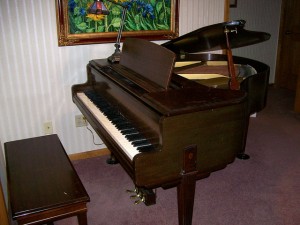Summer is in the air! I can’t believe it, but this week is our last official week of regularly scheduled lessons. Starting on Monday we go into our flexible summer schedule. I can’t believe how quickly each school year flies by. I guess time flies when you’re having fun!
Anyway…. last week I discussed when you should consider switching over from a keyboard or digital piano to an upright or grand piano. Click here to check out that article if you missed it. Today, I’m going to take things a step further and give my take on what you should look for when you buy a new piano.
It’s important to pay attention to the following:
- Action
How a piano key plays when it’s depressed is called its action. I suggest that you play every key– black and white. Make sure each key works and is not broken– doesn’t play or sticks. Beyond that, each key should feel the same when you press it down. If it doesn’t feel even, take note of the particular notes (no pun intended). These keys may be able to be repaired, so if something doesn’t work, all is not lost.
- Tone
Listen to the overall tone while you test each key. It’s best to get a piano where the tone is as even as possible. You don’t want the high notes to sound bright and “tinny” compared to the rest of the piano. If you play piano, play a piece or a few on the pianos you are interested in. If you don’t play piano, bring a pianist friend along or have a store employee play some music for you. Listen and make sure you like the sound. Every piano has a different overall tone (even pianos of the same model from the same company). I personally prefer a tone that’s not extremely bright sounding. Make sure the tone sounds nice to you.
- Pedals
Try each of the 2-3 pedals while you play a piece. Make sure all three (particularly the damper pedal, which is on the far right) work properly. Also check to make sure there are no loud sounds coming from the pedals as you press them down. Squeaky or loud pedals can really distract from the music you make. Luckily these can often be fixed with a great piano technician.
- Body
Look at the body of the piano. Make sure there are no big nicks or scratches in the finish– unless of course that doesn’t bother you.
- Age and Maintenance
How old is the piano? If it’s not new, when was it first purchased? How heavily was it used during its lifetime? Was it well maintained (given regular tunings, kept in a regulated temperature away from heating/ cooling vents, etc.)? In my opinion, age is not necessarily as important as proper maintenance. I’ve come across many many older pianos that were amazing instruments because they were well taken care of. Not maintaining a piano properly can be disastrous and can result in a piano that’s no good!
In my mind, these are the most important elements of a piano to look at and keep in mind when purchasing one. If you do find problems with the action, tone, or pedals, you may be able to negotiate a better price to cover the cost of a piano technician fixing them. Consider getting an estimate from a piano technician first, as sometimes the scope of work is so great, it increases the cost of the piano exponentially.
Beyond these, please don’t hesitate to ask your teacher for guidance. If you have additional questions or need help, your teacher will be very happy to guide you in the right direction. Personally I have even gone to a piano store in the past, played specific pianos, and given my recommendation on which specific piano a family should buy.
Thanks so much for reading my blog! Leave a comment below and tell me the most important thing you look for when buying a new piano. If you haven’t already, “like us” on Facebook and subscribe to the newsletter list. Have a brilliant day!
Sincerely,
Cassie

{ 0 comments… add one now }